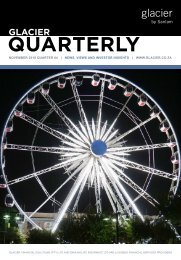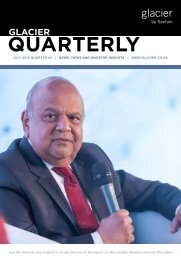Glacier Quarterly 1 - 2018
In this first edition of Glacier Quarterly for 2018, we cast our gaze across the year ahead – with a little more positivity than in previous years.
In this first edition of Glacier Quarterly for 2018, we cast our gaze across the year ahead – with a little more positivity than in previous years.
Create successful ePaper yourself
Turn your PDF publications into a flip-book with our unique Google optimized e-Paper software.
ECONOMY<br />
The first is the budget deficit. Both<br />
government revenue and expenditure as<br />
a share of GDP have continued to rise<br />
sharply – financed in part through the<br />
borrowing that doubled the debt-to-GDP<br />
ratio and through placing a now nearintolerable<br />
burden on individual incometax<br />
payers.<br />
As a result, Ramaphosa’s new<br />
administration may not immediately have<br />
the money to develop the infrastructure<br />
to support an economic recovery while<br />
meeting the welfare and service delivery<br />
demands of several million households.<br />
The antidote is growth, but our forecasts<br />
are that this year growth rates will<br />
underperform emerging market averages<br />
by around 70%. An economic growth rate<br />
of up to 2%, as policymakers are predicting,<br />
is nowhere near the watershed level for<br />
breaking the structural unemployment<br />
crisis – the second major obstacle that<br />
government faces.<br />
The third hurdle is education. To take<br />
just one indicator, over half of the Grade 10<br />
class of 2014 progressed to matric in 2016,<br />
and, of these, less than 3% passed matric<br />
maths with a grade of 60% or higher – a<br />
qualification that offers a young person<br />
the reasonable prospect of ascending<br />
to the middle classes within a decade.<br />
Without doubling the number of matric<br />
maths passes every five years it will be<br />
very difficult for government to deliver on<br />
demands for middle-class access.<br />
For the past several years, the country<br />
has matched the third of our most recent<br />
scenarios – the break-up of South Africa.<br />
In this scenario an out-of-touch and<br />
corrupt government would grow ever<br />
more distant from South Africa’s people.<br />
Counterproductive policy would undermine<br />
investment and entrepreneurship. The fiscal<br />
deficit would deepen and service delivery,<br />
public education and healthcare would<br />
suffer as state coffers run dry. Repelled<br />
by their politicians, South Africans would<br />
withdraw into enclaves – some prosperous<br />
and others urban slums and rural<br />
backwaters. South Africa would continue<br />
to underperform compared to emerging<br />
markets on almost every measure.<br />
But now South Africa has an opportunity<br />
to realise the fourth scenario – the Rise of<br />
the Rainbow – in which a reformed ruling<br />
party will introduce changes to restore<br />
the rule of law and position South Africa<br />
as a competitive investment destination.<br />
Economic growth would exceed 5% by<br />
2029 and the unemployment rate would<br />
be halved. South Africa would turn from<br />
the brink of disaster to become one of the<br />
world’s most exciting emerging markets.<br />
There is not enough evidence to make<br />
the call yet, but within six months to a year<br />
we ought to have enough to say whether<br />
we are likely to continue in the Breakup<br />
or whether South Africa will change<br />
paradigms and enter the era of the Rise of<br />
the Rainbow.<br />
However, to be clear, to upgrade the<br />
scenario will require the right markers<br />
going up on two broad fronts:<br />
• The first front is populated by those<br />
markers that deal with accountable<br />
governance, parastatal reform, state<br />
capture, the rule of law and business<br />
and popular confidence – and they<br />
look a lot better than they did a year<br />
ago.<br />
• But the second front is populated<br />
by those that deal with policy<br />
reform in areas of the labour market,<br />
empowerment policy, property rights<br />
and education – the odds of which<br />
hinge almost entirely on the balance<br />
of forces in the battle of ideas.<br />
If we make the upgrade, it means we’ll<br />
be confident that economic growth rates<br />
will rise to about 4% by 2024 and to over<br />
5% by 2029. The unemployment rate will<br />
fall to below 15% over the same period.<br />
South Africa will quadruple the number<br />
of young people passing maths in matric.<br />
There will be no doubt about property<br />
rights or the rule of law.<br />
Frans Cronje<br />
Scenario planner and<br />
CEO of the SA Institute of<br />
Race Relations (IRR)






